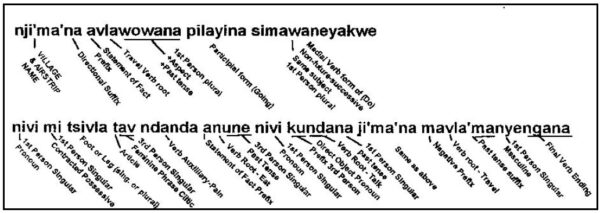Dear Friends,
Gwandambiyeke navi Wanjaka’na avlawala tena kungunda ndima’makwano. (I want to tell you about when Gwandambiyal and I traveled to Wantakia.) A major part of our language study is just being with the people. This time with the people allows us to use the language we are learning, builds relationships and helps us to better understand these people and their lifestyle. It was for all these reasons that I chose to attempt the hike into a neighboring language group. This kind of hiking is a daily part of Simbari life, so this was a great opportunity to be exposed to this area of their lifestyle and of course a few days of speaking only Simbari would be good for me. So I donned my trusty golf shoes, a necessity in a highland rainforest, and hit the trail accompanied by my friend and language helper, Gwandambiyal. We had several thousand feet of altitude to cover just to reach the 8000 foot pass. The trail was cruel and as I climbed through the mountainous jungle often on hands and knees for hour after hour, I can’t say that I can ever remember being in such agony. Crossing slippery log bridges over deep ravines practically paralyzed me with fear. My speech was reduced only to grunts, not exactly helpful for gaining fluency in Simbari! Nine hours later we had reached the village where we would stay the night. We were escorted to a hut that our host apologized for saying it was a bad house good only for pigs! It had a leaf roof, loosely bundled grass walls and no floor. I always wonder how these people can eat so much sweet potato in one sitting. But after a hard day, if that is all there is to eat, it is amazing how much you can put away! How these people can hike like that without hardly drinking anything is hard to believe but they more than made up for it as we sat down in our “pig house” and began to ‘drink’ sugar cane. Normally I can barely finish a 1 foot length but this night I finished 2-3 stalks just like the rest of them! We aren’t the only ones with a sweet tooth. As we sat the people began to come to see the ‘weyapa’. Most of these folks had not seen more than a handful of white men in their life and my visit was quite an event. Finally I was ready to go to sleep. Wanting to have a Simbari style experience I had brought no more than a change of clothes, my camera and notebook. So I curled up on the ground trying to warm myself from the wind that was howling through the walls. Six hours later I was still shaking and trying to fall asleep as the wind blew and the fleas feasted, when one of the men in the house (all of whom were sleeping like babies) woke up and saw me shaking there on the ground. He quickly started a roaring fire and I enjoyed an hour and a half of sleep before the smoke of the morning fire woke me up again. There were 2 more days of hiking and with each village I passed through I was treated like royalty and the children crowded around to the point I could hardly breath when sitting down for a rest. At times I felt like shooing them away, just like the disciples wanted to do. Then I realized what a privilege it was for them to be crowded around me just like they would if Jesus himself were here. But He is here, isn’t He, living His life through me and looking on these little ones with compassion and love. I guess that means I shouldn’t shoo them away. Why is it that in this day one can still hike through village after village and not find one Gospel witness present? These thoughts have challenged us again to our purpose here of bringing God’s Word to the Simbaris. Thank you for your partnership with us in this task.
Back by popular demand, here is another sample of the Simbari language. Here is an excerpt from the text of my hike. The translation is: We were going to Nji’ma but my legs hurt and so I said, “I’m not going to Nji’ma.”
Prayer Update: Esther is 100% recovered from the encephalitis, she has had great reports from the doctor, speech therapist and physical therapist. Thank you for your many prayers.

